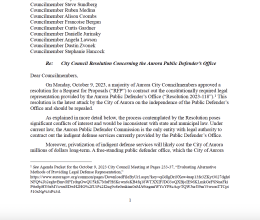The long awaited Aurora theater shooting trial began this week. This is a death penalty trial and is expected to last four to five months. I was able to attend the opening statements, which can only be described as heart wrenching. They were a preview for what is to come over these months and I believe represent a strong argument against the death penalty.
As the prosecution started the day with their opening statement, they described in detail the events that took place in the movie theater on July 20, 2012. They played audio of 911 calls, shared the names of many of the victims and showed graphic images of injuries to the jury. Many people in the courtroom were moved to tears, especially the victims as they were finally, after nearly three years, forced to relive this night.
The defense’s opening statement painted a different tragedy, that of severe mental illness. It was distressing to think of an individual succumbing to schizophrenia and what that disease does to the mind.
Opening statements also brought out facts and information that were unknown to the public until now. Details of the tragedy and events leading up to it as well as information about the defendant’s actions directly after the shooting took place. These details truly bring the horror of the theater shooting back to life and while it fills in the blanks for a lot of the public and victims involved, it also forces people to relive the whole tragedy over again.
If the defendant is eventually found guilty, the trial will then move into the sentencing phase. After this, if he is sentenced to death, many people think that will finally mean closure for the victims and community. In reality, it is the opposite.
As with all death penalty cases, the defendant is entitled to appeals, these are in place because the punishment cannot be reversed once it is carried out. These appeals mean that victims, family members and the community will be forced to relive the details of this crime over again. The emotional turmoil of hearing about the case and the defendant’s name will continue for years to come. After just a few days of listening to testimony about that night, I can’t imagine having to go through this for the duration of the trial, let alone know that that is not the end.
This is a fundamental problem with the death penalty. Ultimately it does not provide closure and does not allow victims to heal. More and more victims and their family members are coming out against the death penalty for this very reason.
Last year in Colorado, Bob Autobee pleaded with the District Attorney not to seek death for his son’s killer, and ended up protesting outside of jury selection for the trial. Eventually he was joined by several other family members of murder victims who also don’t believe in the death penalty.
More recently in Boston, as the trial for the Boston bomber entered the sentencing phase, several victims and family members publicly stated their opposition to the death penalty, arguing that they were ready for it all to be over. Ultimately the death penalty would not provide them closure.
The false promise that vengeance is justice just perpetuates the broken death penalty system. In reality, murdering the murderer will not bring anyone back and the prolonged capital punishment process just elongates the nightmare for victims, family members and the community.
The death penalty's false promise
Related Issues
Related content
HB24-1306 Increase Penalty Possession of Synthetic Opiates
April 16, 2024Jury Finds Denver Police Officers Violated Colorado Constitution,...
March 4, 2024HB24-1170 Rights for Youth Division of Youth Services Facilities
January 31, 2024SB24-012 Reentry Workforce Development Cash Assistance Pilot Program
January 10, 2024Armendariz and Chinook Center v. City of Colorado Springs, et al.
December 18, 2023